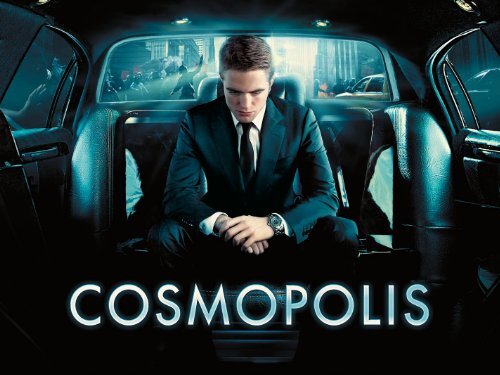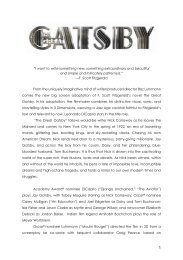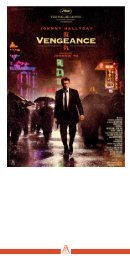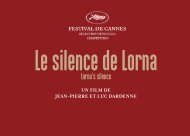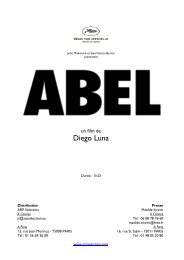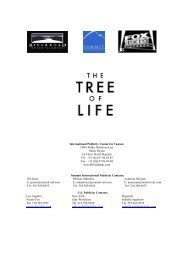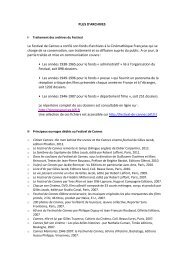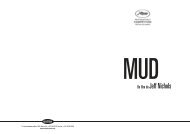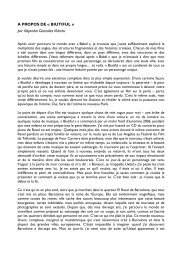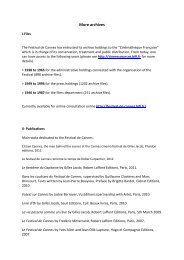in English - Cannes International Film Festival
in English - Cannes International Film Festival
in English - Cannes International Film Festival
Create successful ePaper yourself
Turn your PDF publications into a flip-book with our unique Google optimized e-Paper software.
<strong>in</strong>ternational sales<br />
grégOIrE MELIN / gAËLLE MArESCHI<br />
30, rue Moret - 75011 Paris | France<br />
Tel.: +33 9 51 47 43 44<br />
Fax: +33 9 56 47 43 44<br />
ProDuction<br />
ALFAMA FILMS PrODuCTION<br />
PAuLO BrANCO<br />
176, rue du Temple - 75003 Paris | France<br />
Tel.: +33 1 42 01 07 05<br />
alfamafilms@orange.fr<br />
www.alfamafilms.com<br />
IN CANNES:<br />
rIVIErA Stand D1 / E2 - D3 / E4<br />
Tel.: +33 4 92 99 32 32<br />
A FILM BY DAVID BASED ON THE NOVEL BY DON<br />
LENgTH 108 mn - IMAgE FOrMAT 1.85 - SOuND Dolby srD<br />
www.cosmoPolisthefilm.COM<br />
Public relations<br />
BruNO BArDE<br />
ALExIS DELAgE-TOrIEL / HéDI ZArDI<br />
40, rue Anatole France - 92594 Levallois-Perret cedex | France<br />
Tel.: +33 1 41 34 22 03 / 20 86 - Fax: +33 1 41 34 20 77<br />
adelagetoriel@lepublicsystemec<strong>in</strong>ema.fr<br />
hzardi@lepublicsystemec<strong>in</strong>ema.fr<br />
www.lepublicsystemec<strong>in</strong>ema.fr<br />
IN CANNES:<br />
13, rue d’Antibes - 4 TH floor - 06400 <strong>Cannes</strong> | France<br />
Tel.: +33 4 93 30 10 38 / 10 39 - Fax: +33 4 93 30 11 32
New York is <strong>in</strong> turmoil, the age of capitalism is draw<strong>in</strong>g to a close end. Eric Packer,<br />
a high f<strong>in</strong>ance golden boy, dives <strong>in</strong>to a white limous<strong>in</strong>e. while a visit from the<br />
President of the united States paralyses Manhattan, Eric Packer has one obsession:<br />
gett<strong>in</strong>g a haircut at his barber’s at the other end of the city. As the day goes by,<br />
chaos sets <strong>in</strong>, and he watches helplessly as his empire collapses. Also he is sure that<br />
someone is go<strong>in</strong>g to assass<strong>in</strong>ate him. when? where? He is about to live the most<br />
decisive 24 hours of his life.
what immediately strikes one when watch<strong>in</strong>g COSMOPOLIS is that David Cronenberg has once aga<strong>in</strong> taken up<br />
the challenge of mak<strong>in</strong>g the film of the impossible-to-adapt book, and <strong>in</strong> do<strong>in</strong>g so expands and enhances a unique<br />
body of work haunted by themes that were considered obsessive or marg<strong>in</strong>al when he started out but «recount»<br />
the world like no other directors’ movies.<br />
After the feats that are his NAKED FEAST, <strong>in</strong>spired by william S. Burroughs, and CrASH, based on J.g. Ballard,<br />
here is Cronenberg’s vision of Don DeLillo’s novel, «Cosmopolis» — its «externalization» <strong>in</strong> some way. DeLillo<br />
said of this prophetic and hellish take on where the world is headed that he has concentrated on a literary sphere<br />
all the voices herald<strong>in</strong>g the catastrophe that was to come and is now upon us. Cronenberg echoes this approach<br />
by creat<strong>in</strong>g a c<strong>in</strong>ematic space that comb<strong>in</strong>es genres and literally bowls the audience over. You come out groggy,<br />
unsure where you are. what you can be sure of is that Cronenberg has always been a visionary. Yes, the man<br />
has always had with<strong>in</strong> him «parasite murders» that gradually transform him <strong>in</strong>to a mutant irredeemably gnaw<strong>in</strong>g<br />
at society. wall Street’s golden boys are the latest result of this mutation, and they will f<strong>in</strong>ish off the disease-ridden<br />
body of the «Cosmopolis». — François GueriF, Director of the rivages noir collection.
DiD you know Don Delillo’s novel?<br />
No, I hadn’t read it. Paulo Branco and his son Juan Paulo came to suggest that I adapt it<br />
for the screen, Paulo told me: «My son th<strong>in</strong>ks you are the one who should make the film». I<br />
knew other books by DeLillo, and I knew Paulo and the many great films he has produced,<br />
so I thought: it’s worth tak<strong>in</strong>g a look. This is quite unusual for me, s<strong>in</strong>ce I generally prefer<br />
to come out with my own projects. But because of these two, I said OK and took the book.<br />
Two days later, I had read it and I called Paulo to say: «All right, I’m <strong>in</strong>».<br />
you wanteD to write the screenPlay yourself?<br />
Def<strong>in</strong>itely. And you know what? I did it <strong>in</strong> six days. That’s unprecedented. In fact, I started<br />
typ<strong>in</strong>g down all the dialogues from the book on my computer, without chang<strong>in</strong>g or add<strong>in</strong>g<br />
anyth<strong>in</strong>g. It took me 3 days. when I was done, I wondered: «Is there enough material for<br />
a film? I th<strong>in</strong>k so». I spent the next three days fill<strong>in</strong>g up the gaps between dialogues and<br />
just like that, I had a script. I sent it to Paulo, who first said: «You’re rush<strong>in</strong>g it». But <strong>in</strong> the<br />
end he liked the script and off we went.<br />
what conv<strong>in</strong>ceD you that the novel coulD be turneD <strong>in</strong>to a film,<br />
anD that you wanteD to Direct it?<br />
The amaz<strong>in</strong>g dialogues. DeLillo is famous for it, but the dialogues <strong>in</strong> Cosmopolis are<br />
especially brilliant. Some dialogues are said to be «P<strong>in</strong>teresque», a la Harold P<strong>in</strong>ter, but<br />
I th<strong>in</strong>k we should also talk about «DeLillesque» dialogues. Except P<strong>in</strong>ter is a playwright,<br />
his virtuosity as a dialogist is more obvious, but as far as novels are concerns, Don’s work<br />
clearly shows exceptional expressive power.<br />
what was your take on Don Delillo’s worlD?<br />
I had read several of his books, «Libra», «underworld», «runn<strong>in</strong>g Dog»… I really like his<br />
work, even if it’s all-American. I am not American, I am Canadian. It is really different.<br />
Americans and Europeans th<strong>in</strong>k of Canadians as better behaved and slightly more sophisticated<br />
versions of Americans, but it is far more complicated than that. In Canada, we didn’t<br />
have a revolution, slavery, or a civil war, here only the police and the army carry guns, we<br />
don’t share such civilian armed violence at all, and we have a deep sense of community,<br />
and of the necessity to provide everyone with a m<strong>in</strong>imum <strong>in</strong>come. Americans regard us as<br />
a socialist country! It is somewhat different with DeLillo’s books, because I can grasp his<br />
vision of America, he makes it understandable and I can relate to it.<br />
both the novel anD the film take Place <strong>in</strong> new york, but <strong>in</strong> slightly<br />
Different ways. the book gives meticulous geograPhical Details,<br />
while the film is more abstract.<br />
In the novel, Eric Packer’s limous<strong>in</strong>e crosses Manhattan from East to west along 47th Street.<br />
Many places described <strong>in</strong> the book don’t exist anymore, this New York has become partly<br />
imag<strong>in</strong>ary. To me, even if the book is unquestionably set <strong>in</strong> New York, it is a very subjective<br />
New York, we are actually <strong>in</strong> Eric Packer’s m<strong>in</strong>d. His version of the city is mostly cut<br />
off from the realities of the street, he doesn’t really understand the people or the city itself.<br />
Therefore I thought it was legitimate to settle for a more abstract vision, even though it is<br />
really New York that you can see unfold<strong>in</strong>g beh<strong>in</strong>d the car’s w<strong>in</strong>dows.<br />
a DecaDe has PasseD between the writ<strong>in</strong>g of the novel anD the<br />
mak<strong>in</strong>g of the film. DiD you th<strong>in</strong>k of it as a Problem?<br />
I didn’t, because the novel is surpris<strong>in</strong>gly prophetic. And while we were mak<strong>in</strong>g the film,<br />
th<strong>in</strong>gs happened that were described <strong>in</strong> the novel, rupert Murdoch received a pie <strong>in</strong> the<br />
face, and of course there has been the «Occupy wall Street» movement, after we f<strong>in</strong>ished<br />
shoot<strong>in</strong>g. I had to change very few th<strong>in</strong>gs to make the story contemporary, the only difference<br />
is we used the Yuan <strong>in</strong>stead of the Yen. I don’t know if DeLillo has stock accounts but<br />
he should: he has a remarkably perceptive vision of what is go<strong>in</strong>g on and how th<strong>in</strong>gs are<br />
go<strong>in</strong>g to turn out… The film is contemporary, while the book was prophetic.<br />
you reaD a book Differently when you know that you might<br />
turn it <strong>in</strong>to a film.<br />
Yes <strong>in</strong>deed. It had never happened to me, I don’t read books th<strong>in</strong>k<strong>in</strong>g: Could this make a<br />
film? It is not what I usually look for, I just read a lot because I enjoy it. It would spoil the<br />
fun. But this time, I found myself mak<strong>in</strong>g two th<strong>in</strong>gs at once, read<strong>in</strong>g both as the reader of<br />
a good novel and as a director wonder<strong>in</strong>g if there is enough material for a film. Of course,<br />
afterwards, once there is an adaptation, you get a fusion between the sensibility of two<br />
authors, <strong>in</strong> this case DeLillo and myself. It was the same th<strong>in</strong>g with Ballard or Stephen K<strong>in</strong>g.<br />
It is like mak<strong>in</strong>g a child, you need two people, and the film turns out look<strong>in</strong>g a little bit<br />
like both of its «parents», or it is like Marxist dialectics. Indeed I couldn’t but th<strong>in</strong>k a little<br />
about Marx while mak<strong>in</strong>g the film, if only because you can hear the first sentence from the<br />
«Communist Manifesto» <strong>in</strong> it, «a spectre is haunt<strong>in</strong>g the world»…<br />
only now it’s not euroPe, it’s the worlD you’re talk<strong>in</strong>g about…<br />
Sure. But here is an important topic, one that I had never really tackled before: money.<br />
The power of money, the way it shapes the world. In order to deal with it, I didn’t need to<br />
make thorough research <strong>in</strong>to the world of f<strong>in</strong>ance. Its agents are everywhere to be seen.<br />
They are on television, <strong>in</strong> documentaries, <strong>in</strong> the papers. They do and say what DeLillo<br />
wrote, their behavioural patterns are just like Eric Packer’s. To me, the reference to Marx<br />
isn’t trivial. In the «Communist Manifesto», Marx writes about modernism, about the time<br />
when capitalism will have reached such a degree of expansion that society will go too fast<br />
for the people, and when the impermanent and the unpredictable will rule. In 1848! And<br />
this is exactly what you get to see <strong>in</strong> the film. I often wondered what Karl Marx would have<br />
thought about the film, because it shows a lot of th<strong>in</strong>gs he had foreseen.<br />
what Do you mean by «fill<strong>in</strong>g uP the gaPs» between Dialogues?<br />
After three days, my dialogues were «<strong>in</strong> limbo», I had to figure out how to make them<br />
happen <strong>in</strong> the limous<strong>in</strong>e. Therefore I had to describe the limo <strong>in</strong> detail: where does Eric sit?<br />
where are the others? what is happen<strong>in</strong>g <strong>in</strong> the streets? In what k<strong>in</strong>d of sett<strong>in</strong>g does the<br />
cream pie attack occur? And so on. It is mostly practical stuff, like choos<strong>in</strong>g sett<strong>in</strong>gs and<br />
props, but it does shape the film. I have never written a screenplay for another director, so<br />
when I write, I always have the direct<strong>in</strong>g <strong>in</strong> my m<strong>in</strong>d. To me, a script is also a plan for my<br />
crew and the actors, and a production tool too. You have to th<strong>in</strong>k of all that at once, what<br />
k<strong>in</strong>d of <strong>in</strong>formation will the set designer, the prop designer or the costume designer need?<br />
what are the f<strong>in</strong>ancial consequences of such and such option? Etc.
among the changes you maDe, there is that scene at the enD of<br />
the book when eric Packer f<strong>in</strong>Ds himself on a film set…<br />
Yes, I soon as I read it, I thought: it’s not really happen<strong>in</strong>g, it is only <strong>in</strong> Packer’s m<strong>in</strong>d. I don’t<br />
believe it. And I couldn’t see myself film<strong>in</strong>g dozens of naked bodies <strong>in</strong> a street of New York.<br />
I am wary of films with<strong>in</strong> films. It can be <strong>in</strong>terest<strong>in</strong>g, but only when it’s called for. It is one<br />
of the ma<strong>in</strong> cuts I made from the book, together with the bags lady, the homeless woman<br />
they f<strong>in</strong>d <strong>in</strong> the car when com<strong>in</strong>g back from the rave party. I shot the scene, but afterwards<br />
I thought the situation was unlikely, artificial, so I edited it out.<br />
anD of course you also cut the chaPters <strong>in</strong> which benno lev<strong>in</strong><br />
<strong>in</strong>tervenes with<strong>in</strong> the story, before the f<strong>in</strong>al meet<strong>in</strong>g.<br />
It wouldn’t have worked <strong>in</strong> the film. we would have needed a voice-over or one of these<br />
devices which often generate poor results. I preferred to save it all for the meet<strong>in</strong>g between<br />
Packer and him, the f<strong>in</strong>al sequence, which is very long: 20 m<strong>in</strong>utes. 20 m<strong>in</strong>utes of dialogues!<br />
It is a choice, the k<strong>in</strong>d of choices you have to make to turn a novel <strong>in</strong>to a film. Then<br />
aga<strong>in</strong>, when a script is over, I still don’t know what k<strong>in</strong>d of film I am go<strong>in</strong>g to make. I am<br />
often asked if the outcome is up to my expectations, but I have no expectations to beg<strong>in</strong><br />
with. It would be absurd to devise a k<strong>in</strong>d of bluepr<strong>in</strong>t or an ideal, and to try and match it<br />
as closely as possible. Only the countless steps <strong>in</strong> the mak<strong>in</strong>g of a film can make it what it<br />
is <strong>in</strong> the end. And it’s all for the best. This is why I don’t make storyboards: everybody just<br />
tries to recreate what was drawn. That is not my idea of c<strong>in</strong>ema. I need to be surprised, by<br />
myself and by the others. Start<strong>in</strong>g with the actors, of course. But even with Peter Suschitzky,<br />
the c<strong>in</strong>ematographer I have been work<strong>in</strong>g with s<strong>in</strong>ce 1987, we are always try<strong>in</strong>g out new<br />
th<strong>in</strong>gs and try<strong>in</strong>g to surprise each other. It’s more fun that way.<br />
how DiD you choose the sett<strong>in</strong>gs?<br />
Strangely enough, 47th street <strong>in</strong> New York looks quite like some streets <strong>in</strong> Toronto. we<br />
created the space of the film by putt<strong>in</strong>g together genu<strong>in</strong>e elements from New York with<br />
others from Toronto, where we were film<strong>in</strong>g the <strong>in</strong>terior shots. we couldn’t shoot the whole<br />
film <strong>in</strong>side a real limo, we had to recreate some scenes <strong>in</strong> the studio so that we could move<br />
the camera around. Therefore, what you see <strong>in</strong> the foreground beh<strong>in</strong>d the car’s w<strong>in</strong>dows<br />
are mostly rear projections. The ma<strong>in</strong> th<strong>in</strong>g is the limo itself, which is not so much a car as a<br />
mental space: be<strong>in</strong>g <strong>in</strong>side the limo is be<strong>in</strong>g <strong>in</strong>side Eric Packer’s head. This is what matters.<br />
<strong>in</strong>siDe the «ProusteD» limo. the worD Doesn’t aPPear <strong>in</strong> the french<br />
translation…<br />
really? It is <strong>in</strong> the novel, though, it is a neologism made up by DeLillo as a reference to<br />
Proust, who had his room corkl<strong>in</strong>ed. DeLillo <strong>in</strong>vented the verb «to proust». I’m not sure<br />
many people will understand the allusion, but I didn’t want to expla<strong>in</strong> it, anyway I th<strong>in</strong>k the<br />
word generates some question<strong>in</strong>g, a distortion. It’s just as well. we did some hard th<strong>in</strong>k<strong>in</strong>g<br />
about the <strong>in</strong>ner fitt<strong>in</strong>gs of the car, which looks just like any other limo from the outside. The<br />
k<strong>in</strong>d of throne on which Packer sits isn’t really plausible, but it epitomizes the balance of<br />
power, the predeterm<strong>in</strong>ed relationship between the master of the place and his guests.<br />
Many fitt<strong>in</strong>gs come from the book, <strong>in</strong>clud<strong>in</strong>g the marble floor.<br />
<strong>in</strong> the book, there are screens on which he sees himself <strong>in</strong> the<br />
future… just like he sees his own Death <strong>in</strong> the glass of his watch<br />
at the enD. you DiDn’t keeP this element.<br />
I tried to, we shot scenes <strong>in</strong> which he sees himself a little bit further <strong>in</strong> time. But it looked<br />
fake, to me it was just a trick. I thought that you either make a big deal of it, underl<strong>in</strong><strong>in</strong>g<br />
it more, or you just drop the whole th<strong>in</strong>g. If Eric Packer sees the future, it becomes a ma<strong>in</strong>
feature of the character, and somehow I have already tackled this issue <strong>in</strong> DEAD ZONE.<br />
we kept only one sentence from this whole idea of anticipation, «why do I see th<strong>in</strong>gs that<br />
haven’t happened yet?», because it has to do with the fact that he is a billionaire.<br />
how was the cast<strong>in</strong>g Process?<br />
Interest<strong>in</strong>gly, as was already the case for A DANgErOuS METHOD, the actors weren’t<br />
those I had <strong>in</strong> m<strong>in</strong>d to beg<strong>in</strong> with. Both times, it was part of the permanent re<strong>in</strong>vention of<br />
the film. For COSMOPOLIS, at first Col<strong>in</strong> Farrell was to play the ma<strong>in</strong> part, and Marion<br />
Cotillard was to play Elise, Eric Packer’s wife. Then, Farrell had a conflict<strong>in</strong>g schedule and<br />
Marion Cotillard was pregnant. So I changed the script, adjust<strong>in</strong>g it to a younger actor,<br />
which is more faithful to the book, and of course his wife also had to be younger. It’s much<br />
better this way. The real problem is when you have made fund<strong>in</strong>g arrangement based on<br />
the name of an actor and he walks away – it’s not an artistic problem, it’s a money problem.<br />
But this wasn’t really an issue for us.<br />
DiD you th<strong>in</strong>k of robert Patt<strong>in</strong>son right away?<br />
Yes. His work <strong>in</strong> TwILIgHT is <strong>in</strong>terest<strong>in</strong>g, although of course it falls with<strong>in</strong> a particular framework.<br />
I also watched LITTLE ASHES and rEMEMBEr ME, and I was conv<strong>in</strong>ced he could<br />
become Eric Packer. It is a heavy part, he appears on each and every shot, and I don’t<br />
th<strong>in</strong>k I have ever made a film on which the same actor literally never leaves the frame. The<br />
choice of an actor is a matter of <strong>in</strong>tuition, there are no rules or <strong>in</strong>structions about it.<br />
for this film, you’ve teameD uP aga<strong>in</strong> with most of the PeoPle you<br />
usually work with, like Peter suschitzky, or comPoser howarD<br />
shore, who has written music for all your films, start<strong>in</strong>g with<br />
the brooD, thirty-three years ago. DiD you have any sPecial requirements<br />
for the music this time?<br />
Howard Shore was one of the first persons I sent the script to. It had two characteristics.<br />
First, it featured music, like songs from Sufi rapper Brutha Fez, or Erik Satie. Also, there was<br />
a huge amount of dialogues, which is quite challeng<strong>in</strong>g for the score, especially when dialogues<br />
are subtle and you just cannot put trumpets all over them. we needed a music that<br />
was discreet but still capable of establish<strong>in</strong>g certa<strong>in</strong> tones. Howard worked with Canadian<br />
band Metric, s<strong>in</strong>ger Emily Ha<strong>in</strong>es uses her voice like an <strong>in</strong>strument, <strong>in</strong> a subtle way that<br />
perfectly met our needs.<br />
you <strong>in</strong>sisteD that your actors shoulD say their l<strong>in</strong>es exactly as<br />
they were written…<br />
Yes I did. You can make a film <strong>in</strong> a way that allows the actors to improvise, great directors<br />
have successfully done it, but I have a different perspective. I don’t th<strong>in</strong>k it is the actors’ job<br />
to write dialogues. Especially for this film, s<strong>in</strong>ce the dialogues, by Don DeLillo himself, were<br />
the reason why I wanted to make it <strong>in</strong> the first place. That be<strong>in</strong>g said, the actors still had<br />
broad leeway, tone and rhythm were entirely up to them. It was particularly <strong>in</strong>terest<strong>in</strong>g for<br />
robert Patt<strong>in</strong>son, on whose limo various characters turn up, played by very different actors.<br />
It brought him to act differently depend<strong>in</strong>g on which actor was opposite him.<br />
DiD you try to shoot the film chronologically?<br />
As much as possible. It was the case for almost all the scenes with<strong>in</strong> the limo. Paul giamatti<br />
came at the end, and the last scene we shot is the f<strong>in</strong>al scene <strong>in</strong> the film. Sometimes there<br />
were practical impediments, but for the most part, I managed to respect chronology better<br />
than on my previous films. given that the story unfolds <strong>in</strong> a s<strong>in</strong>gle day, but follow<strong>in</strong>g a<br />
complex evolution, it was especially beneficial to work that way.
DAVID CrONENBErg<br />
SELECT FILMOgrAPHY<br />
Director<br />
Cosmopolis (2012)<br />
a DanGerous methoD (2011)<br />
eastern promises (2007)<br />
at the suiCiDe oF the last Jew <strong>in</strong> the worlD at the last C<strong>in</strong>ema <strong>in</strong> the worlD (2007)<br />
a history oF ViolenCe (2005)<br />
spiDer (2002)<br />
Camera (2001)<br />
eXistenZ (1999)<br />
Crash (1996)<br />
m. ButterFly (1993)<br />
nakeD lunCh (1991)<br />
DeaD r<strong>in</strong>Gers (1988)<br />
the Fly (1986)<br />
the DeaD Zone (1983)<br />
ViDeoDrome (1983)<br />
sCanners (1981)<br />
the BrooD (1979)<br />
Fast Company (1979)<br />
raBiD (1977)<br />
the italian maCh<strong>in</strong>e (1976)<br />
shiVers (1975)<br />
lakeshore (1972)<br />
Fort york (1972)<br />
<strong>in</strong> the Dirt (1972)<br />
sCarBorouGh BluFFs (1972)<br />
w<strong>in</strong>ter GarDen (1972)<br />
Don Valley (1972)<br />
Jim ritChie sCulptor (1971)<br />
tourettes (1971)<br />
letter From miChelanGelo (1971)<br />
Crimes oF the Future (1970)<br />
stereo (1969)<br />
From the Dra<strong>in</strong> (1967)<br />
transFer (1966)
how DiD the Project to aDaPt cosmoPolis come about?<br />
I wasn’t beh<strong>in</strong>d it. In 2007, Paulo Branco <strong>in</strong>vited me to take part <strong>in</strong> the Estoril <strong>Film</strong> <strong>Festival</strong>,<br />
which he coord<strong>in</strong>ates <strong>in</strong> Portugal. He likes to have people from outside the c<strong>in</strong>ema <strong>in</strong>dustry,<br />
such as writers, pa<strong>in</strong>ters or musicians, to sit <strong>in</strong> the jury, and it is <strong>in</strong>deed a very pleasant<br />
experience to talk about films that way. On this occasion, he told me about the project;<br />
actually, it was his son Juan Paulo’s idea <strong>in</strong> the first place. He had already optioned the<br />
rights to the book. I knew his career as a producer, the impressive list of great filmmakers<br />
he has worked with, so I said yes. Then the question of the director arose, and I th<strong>in</strong>k Juan<br />
Paulo is aga<strong>in</strong> the one who suggested David Cronenberg. Next th<strong>in</strong>g I knew, Cronenberg<br />
was on board and it was a done deal, <strong>in</strong> the best possible way. It all happened very<br />
quickly, actually.<br />
DiD you reaD the scriPt?<br />
Yes I did, and it was <strong>in</strong>credibly close to the book. Of course, Cronenberg cut out a few<br />
scenes that couldn’t work out, but it is totally faithful to the spirit of the novel. Of course, I<br />
had no <strong>in</strong>tention to make comments when I read it, it had become a Cronenberg film. It is<br />
my novel, but it is his film, there is no question about it. Then, last March, I saw the film <strong>in</strong><br />
New York once it was completed. I was really impressed. It is as uncompromis<strong>in</strong>g as it can<br />
possibly be. I liked it from the very beg<strong>in</strong>n<strong>in</strong>g, from the open<strong>in</strong>g credits: what an amaz<strong>in</strong>g<br />
idea to start with Jackson Pollock, and to f<strong>in</strong>ish with rothko, for that matter. And the f<strong>in</strong>al<br />
scene, with robert Patt<strong>in</strong>son and Paul giamatti, is just m<strong>in</strong>d-blow<strong>in</strong>g!<br />
what DiD you th<strong>in</strong>k about aDaPt<strong>in</strong>g this very novel for the<br />
screen?<br />
Throughout the years, there have been many proposals to adapt several of my books, but<br />
they have never come through. I thought that adapt<strong>in</strong>g COSMOPOLIS would be particularly<br />
tricky, s<strong>in</strong>ce most action is conf<strong>in</strong>ed with<strong>in</strong> a car, which doesn’t translate well to the<br />
screen. But not only did Cronenberg respect that, he also shot <strong>in</strong> the limo some scenes that<br />
orig<strong>in</strong>ally happened elsewhere, like the sequence with Juliette B<strong>in</strong>oche, for <strong>in</strong>stance.<br />
there is a ParaDox about your books: although crammeD with<br />
references to c<strong>in</strong>ema, they seem imPossible to aDaPt to the screen.<br />
You are right, but I just cannot expla<strong>in</strong> it. I thought that «Libra» or «white Noise» could<br />
easily be turned <strong>in</strong>to films, but apparently it is very complicated. I don’t know why. Anyway,<br />
don’t expect me to take care of it myself and write a screenplay.<br />
c<strong>in</strong>ema Plays a large Part <strong>in</strong> your books, but harDly ever by<br />
means of a reference to a Particular film or filmmaker. it is more<br />
the iDea of c<strong>in</strong>ema than such or such moDel or Personality.<br />
Indeed, what matters is more a c<strong>in</strong>ematographic sensibility than some films <strong>in</strong> particular.<br />
I grew up <strong>in</strong> the Bronx, we used to watch westerns, musicals, gangster flicks – at that<br />
time I didn’t know what a film noir was. Then I moved <strong>in</strong> to Manhattan, and I discovered<br />
Antonioni, godard, Truffaut, the great modern European directors, and also Japanese<br />
directors, start<strong>in</strong>g with Kurosawa. To me it was a revelation: the magnitude of such films<br />
equalled that of the greatest novels! Many people th<strong>in</strong>k that <strong>in</strong> the 1960s I quit my job <strong>in</strong><br />
an advertis<strong>in</strong>g company to write my first novel. Not at all: I just quit so I could go to the<br />
movies every afternoon. Only afterwards did I seriously take up writ<strong>in</strong>g.<br />
then you wrote americana, the story of a man who haPPens to<br />
quit his job <strong>in</strong> the meDia <strong>in</strong>Dustry to Direct a film…<br />
Exactly! (He laughs) And s<strong>in</strong>ce then, as I live close to New York, I keep discover<strong>in</strong>g many<br />
new films that have become impossible to watch <strong>in</strong> a theatre anywhere else <strong>in</strong> the united<br />
States. At some po<strong>in</strong>t <strong>in</strong> my life I lived <strong>in</strong> greece, for three years, and I was film-starved,<br />
many good films weren’t shown there, I really missed it. Otherwise, I have kept a close<br />
look on what has been happen<strong>in</strong>g <strong>in</strong> the c<strong>in</strong>ema <strong>in</strong>dustry, and I th<strong>in</strong>k that lately THE TurIN<br />
HOrSE by Bela Tarr, THE TrEE OF LIFE by Terrence Malick or MELANCHOLIA by Lars von<br />
Trier have been real milestones.<br />
<strong>in</strong> your novels, there aren’t only numerous references to c<strong>in</strong>ema,<br />
characters who want to make films, lost films or secret films,<br />
etc. there is someth<strong>in</strong>g quite c<strong>in</strong>ematograPhic <strong>in</strong> the narration<br />
itself, for <strong>in</strong>stance the trajectory of the boy anD the baseball at<br />
the beg<strong>in</strong>n<strong>in</strong>g of unDerworlD is comPoseD as a film sequence.<br />
It is because when I write, I need to see what is happen<strong>in</strong>g. Even when it is just two guys<br />
talk<strong>in</strong>g <strong>in</strong> a room, writ<strong>in</strong>g dialogues is not enough. I need to visualize the scene, where<br />
they are, how they sit, what they wear, etc. I had never given much thought about it, it<br />
came naturally, but recently I became aware of that while work<strong>in</strong>g on my upcom<strong>in</strong>g novel,<br />
<strong>in</strong> which the character spends a lot of time watch<strong>in</strong>g file footage on a wide screen, images<br />
of a disaster. I had no problem describ<strong>in</strong>g the process, that is to say to rely on a visualization<br />
process. I am not comfortable with abstract writ<strong>in</strong>g, stories that look like essays: you<br />
have to see, I need to see.<br />
you are italian-american. have you felt a Particular k<strong>in</strong>shiP<br />
with the generation of great italian-american Directors that<br />
maDe its breakthrough <strong>in</strong> the 1970s, anD with which you were<br />
contemPorary?<br />
I really liked MEAN STrEETS. I grew up <strong>in</strong> the Bronx and Scorsese <strong>in</strong> Lower Manhattan, <strong>in</strong><br />
Little Italy, but we shared the same language, the same accents and the same behaviours.<br />
Needless to say I was familiar with troublemakers like robert De Niro’s character, I even<br />
knew some of them very well. But the most significant experience probably dates back<br />
further. I was very young when I saw MArTY by Delbert Mann, which takes place where<br />
I used to live, <strong>in</strong> the Italian part of the Bronx. The film was shown <strong>in</strong> Manhattan, so there<br />
were eight of us guys, packed <strong>in</strong> a car to go and watch it. The open<strong>in</strong>g scene takes place<br />
<strong>in</strong> Arthur Avenue. It was our place! See<strong>in</strong>g our street, the shops we patronized, there <strong>in</strong> a<br />
movie theatre, that was amaz<strong>in</strong>g. It was as if our very existence was acknowledged. we<br />
never would have thought that somebody would make a film <strong>in</strong> those streets.<br />
how DiD you react when you hearD that DaviD cronenberg was<br />
to aDaPt your novel?<br />
I was delighted. I missed a few of his earliest films, but at least s<strong>in</strong>ce DEAD rINgErS, I<br />
have seen them all. I am particularly fond of CrASH and ExISTENZ, and of course A<br />
HISTOrY OF VIOLENCE. At first I wondered if it was the k<strong>in</strong>d of material he usually worked<br />
with. I didn’t th<strong>in</strong>k so, but I thought it could be a good th<strong>in</strong>g, an opportunity for him to<br />
tackle the subject <strong>in</strong> an orig<strong>in</strong>al way. Anyway I was sure he could make the content of the<br />
book visually stunn<strong>in</strong>g, <strong>in</strong> a way that would surprise everybody, <strong>in</strong>clud<strong>in</strong>g myself. I had no<br />
idea what he was up to, but I knew it wouldn’t be conventional.
haD you seen his version of nakeD lunch?<br />
Yes, that’s impressive! Exactly the k<strong>in</strong>d of surprise I was hop<strong>in</strong>g for regard<strong>in</strong>g COSMOPOLIS.<br />
was it when you met with DaviD cronenberg?<br />
Yes, he was <strong>in</strong> Estoril as well. But we didn’t talk much about the project to adapt the book,<br />
I wanted to keep out of it. we talked a bit about the fact that it would be shot ma<strong>in</strong>ly <strong>in</strong><br />
Toronto, I could see that he knew what he was do<strong>in</strong>g, and it was f<strong>in</strong>e by me. we probably<br />
talked about the lead<strong>in</strong>g actor, but this person f<strong>in</strong>ally couldn’t make it. Later on, when<br />
Paulo told me about robert Patt<strong>in</strong>son, I thought that at last, my fourteen-year-old niece<br />
would look up to me.<br />
DiD you visit the set?<br />
No. I was offered to, but I didn’t f<strong>in</strong>d it useful. I have already been on film sets, it’s really<br />
bor<strong>in</strong>g. You spend most of your time wait<strong>in</strong>g.<br />
sPeak<strong>in</strong>g of film location, new york is so imPortant <strong>in</strong> the novel,<br />
weren’t you somewhat worrieD to know that most of the shoot<strong>in</strong>g<br />
was to take Place elsewhere?<br />
The important th<strong>in</strong>g is that it happens <strong>in</strong>side a limous<strong>in</strong>e. It is like a world itself, with several<br />
<strong>in</strong>trusions of various k<strong>in</strong>ds, visitors, or an angry mob. This is what really matters. Besides,<br />
shoot<strong>in</strong>g elsewhere gives the film a more general dimension, of course it is New York, but<br />
it is more the idea of “the great contemporary city” we are deal<strong>in</strong>g with, which is perfectly<br />
f<strong>in</strong>e.<br />
the book was PublisheD <strong>in</strong> 2003, the film will be releaseD <strong>in</strong> 2012,<br />
weren’t you afraiD that this <strong>in</strong>terval was go<strong>in</strong>g to be a Problem?<br />
Interest<strong>in</strong>gly enough, when the film was almost done, the «Occupy wall Street» movement<br />
came out, somewhat strik<strong>in</strong>g a chord with what the film is about. I th<strong>in</strong>k it is only the beg<strong>in</strong>n<strong>in</strong>g,<br />
there is go<strong>in</strong>g to be more of it. Vija K<strong>in</strong>ski, Eric Packer’s Chief of Theory (played<br />
by Samantha Morton <strong>in</strong> the film), expla<strong>in</strong>s to her boss that those protesters are the direct<br />
offspr<strong>in</strong>g of wall Street and capitalism, and that they contribute to refresh and readjust<br />
the system. They help wall Street redef<strong>in</strong>e itself <strong>in</strong> the face of a new context and a bigger<br />
world. In my op<strong>in</strong>ion, this is precisely what is happen<strong>in</strong>g: «Occupy wall Street» hasn’t<br />
reduced the astronomical bonuses raked <strong>in</strong> by corporate executives.<br />
what was your reaction when you first saw the film? DiD you<br />
f<strong>in</strong>D new elements that weren’t <strong>in</strong> the book?<br />
I was thrilled. There are also very funny moments, and I was really impressed by the whole<br />
end<strong>in</strong>g, it takes the film to another level. what happens between Eric Packer and Benno<br />
Lev<strong>in</strong>, the character played by Paul giamatti, is marked by their mutual respect, someth<strong>in</strong>g<br />
that was <strong>in</strong> the book but which is more palpable <strong>in</strong> the film. Indeed, David made the right<br />
decision <strong>in</strong> cutt<strong>in</strong>g two <strong>in</strong>terventions by Benno Lev<strong>in</strong> before they meet. Those two <strong>in</strong>serted<br />
chapters fitted the novel, not the film.
the Dialogues are almost all yours. how Does it feel to hear them?<br />
It is the strangest th<strong>in</strong>g! These are my words, but they take on another life. I wrote this<br />
conversation about art that Eric and the character played by Juliette B<strong>in</strong>oche have, but<br />
somehow it felt like I was discover<strong>in</strong>g it, or even understand<strong>in</strong>g it for the first time.<br />
one of the most imPortant asPects of the book is the way th<strong>in</strong>gs,<br />
anD the worDs assigneD to them, become outDateD anD are left<br />
beh<strong>in</strong>D, follow<strong>in</strong>g a Process of accelerateD obsolescence. Packer<br />
keePs say<strong>in</strong>g «Does this th<strong>in</strong>g still exist?», «how can we still use<br />
such a worD?», «“comPuter“, it’s such a DateD worD», etc.<br />
That’s true, and <strong>in</strong> the novel he has a particular perception of time which projects him<br />
ahead, he sees what is go<strong>in</strong>g to happen next. This aspect has almost disappeared from the<br />
film. For this book, I paid much attention to time, to the way money shapes our perception<br />
of time. They say «time is money», but <strong>in</strong> this context, money is time. This idea is also <strong>in</strong><br />
the film, only <strong>in</strong> different ways.<br />
your name aPPears <strong>in</strong> the clos<strong>in</strong>g creDits for a song <strong>in</strong> the movie.<br />
Yes, I noticed that! It is because of the lyrics I wrote for the Sufi rapper <strong>in</strong> the book, which<br />
were also used <strong>in</strong> the film. This launches the beg<strong>in</strong>n<strong>in</strong>g of a new career for me as a rap<br />
lyricist… I couldn’t be any prouder.
DON DELILLO<br />
BIBLIOgrAPHY<br />
Don Delillo has established himself as a worldwide cult writer. he has received the most prestigious<br />
literary awards, <strong>in</strong>clud<strong>in</strong>g the national Book award, the pen/Faulkner award for his body of work<br />
and the Jerusalem prize.<br />
bibliograPhy<br />
Great Jones Street (2011)<br />
Po<strong>in</strong>t Oméga (2010)<br />
Fall<strong>in</strong>g Man (2008)<br />
Cosmopolis (2003)<br />
The Body Artist (2001)<br />
Libra (2001)<br />
Underworld (1999)<br />
White Noise (1999)<br />
Players (1993)<br />
Mao II (1992)<br />
Americana (1992)<br />
The Names (1990)<br />
Plays<br />
Love-Lies-Bleed<strong>in</strong>g (2006)<br />
Valparaiso (2001)
were you familiar with Don Delillo’s novel?<br />
No. But I had read some of his other novels. I first read the screenplay David Cronenberg<br />
sent me, and then the novel. One is <strong>in</strong>credibly true to the other, it is faithful <strong>in</strong> a way that<br />
seems impossible, for a novel that seemed impossible to adapt. But even before read<strong>in</strong>g<br />
the book, what impressed me the most about the script was the quick-paced rhythm and<br />
the unrelent<strong>in</strong>g tension.<br />
what was it about this film that aPPealeD to you the most?<br />
Cronenberg, obviously! I have played <strong>in</strong> only a few films, and none of them came close<br />
to what I expected work<strong>in</strong>g with him would be like. I wasn’t disappo<strong>in</strong>ted… I knew he<br />
would be very creative, and that it would be a real experience. And I was appealed by<br />
the writ<strong>in</strong>g of the script, like a k<strong>in</strong>d of long poem. And a mysterious poem too. usually<br />
when you read a script, you quickly know what it is about, where it is go<strong>in</strong>g, how it will<br />
end, even if there might be unexpected or sophisticated twists and turns <strong>in</strong> the plot. But this<br />
time it was completely different, the further I read, the less I could figure out where it was<br />
lead<strong>in</strong>g, and the more I wanted to be a part of it. It doesn’t fit any film genre whatsoever,<br />
it is <strong>in</strong> a league of its own.<br />
when you first reaD the scriPt, DiD you see yourself <strong>in</strong> the role,<br />
coulD you imag<strong>in</strong>e what it woulD look like visually?<br />
Not at all. The first time I spoke to David, it is exactly what I told him, that I didn’t visualize<br />
anyth<strong>in</strong>g, and he thought it was a good th<strong>in</strong>g. Besides, I th<strong>in</strong>k that at this po<strong>in</strong>t, he wasn’t<br />
th<strong>in</strong>k<strong>in</strong>g much ahead, it all evolved <strong>in</strong> a progressive, organic way, start<strong>in</strong>g from the text,<br />
towards the many visual choices that shape the film. It is a liv<strong>in</strong>g process. Even dur<strong>in</strong>g<br />
the first week of shoot<strong>in</strong>g, we were all still wonder<strong>in</strong>g what the film would look like once<br />
f<strong>in</strong>ished. It was fasc<strong>in</strong>at<strong>in</strong>g, I felt like the film was fashion<strong>in</strong>g itself.<br />
now that it’s Done, is the film much Different from the scriPt, or<br />
on the contrary DiD you stick to what was written?<br />
It is hard to say, because the film acts on different levels. I’ve seen it twice, the first time I<br />
was amazed by its farcical side, which I knew was there dur<strong>in</strong>g the shoot<strong>in</strong>g, but which<br />
was unexpectedly apparent. The second time, the gravity of what was at stake prevailed.<br />
Both times, there was an audience attend<strong>in</strong>g, but the reactions were wide-rang<strong>in</strong>g, from<br />
laughter to tension over the dark side Cosmopolis also has. Despite its complexity, I was<br />
amazed by the way it reaches a wide range of emotions.<br />
<strong>in</strong> your oP<strong>in</strong>ion, who is eric Packer? how woulD you Describe<br />
him?<br />
To me, Eric is someone who feels like he belongs to another reality, who lives as if he was<br />
born on an other planet, and who tries to discover <strong>in</strong> which reality he should be liv<strong>in</strong>g. In<br />
fact, he doesn’t understand the world as it is.<br />
yet he has enough unDerstanD<strong>in</strong>g of the worlD to make a fortune<br />
<strong>in</strong> it.<br />
Sure, but <strong>in</strong> a very abstract way. Bank<strong>in</strong>g, brok<strong>in</strong>g or speculat<strong>in</strong>g are disconnected activities,<br />
he has done well <strong>in</strong> them, not as a genu<strong>in</strong>e specialist or a masterm<strong>in</strong>d, but rather<br />
thanks to a k<strong>in</strong>d of <strong>in</strong>st<strong>in</strong>ct, someth<strong>in</strong>g much more mysterious, with the help of algorithms<br />
not unlike magical formulas. You can see <strong>in</strong> the film, as well as <strong>in</strong> the book, that his approach<br />
of f<strong>in</strong>ancial data tends to project him <strong>in</strong> the future, so much so that he doesn’t know<br />
how to live <strong>in</strong> the present anymore. He probably grasps the work<strong>in</strong>gs of the real world<br />
somehow, but only <strong>in</strong> peculiar and obscure ways.<br />
DiD you talk about it with DaviD cronenberg?<br />
A bit, yes, but he liked me to search for someth<strong>in</strong>g unexpla<strong>in</strong>ed and unexpla<strong>in</strong>able. He<br />
particularly liked it when I played without really know<strong>in</strong>g what I was do<strong>in</strong>g, and as soon<br />
as he felt that I was mak<strong>in</strong>g up cha<strong>in</strong>s of cause and effect, or com<strong>in</strong>g out with a logical<br />
explanation for Eric’s behaviour, he would <strong>in</strong>terrupt the take. It was a very odd k<strong>in</strong>d of<br />
direct<strong>in</strong>g, entirely based on feel<strong>in</strong>gs rather than ideas.<br />
how DiD you PrePare for the Part?<br />
David doesn’t like rehearsals. we didn’t talk much about the film before the shoot<strong>in</strong>g. And<br />
I only met the other actors on set, dur<strong>in</strong>g production. I discovered them as they appeared,<br />
literally, on Eric Packer’s limous<strong>in</strong>e. And it was quite pleasant. From the beg<strong>in</strong>n<strong>in</strong>g of the<br />
shoot<strong>in</strong>g, I sort of lived <strong>in</strong>side the film, and <strong>in</strong>side the car: I was always there, it was my<br />
home, and I welcomed the other actors <strong>in</strong> my space, sitt<strong>in</strong>g tight on this k<strong>in</strong>d of capta<strong>in</strong>’s<br />
chair, with everybody visit<strong>in</strong>g me. Be<strong>in</strong>g used like that to this environment felt particularly<br />
comfortable. Everyone else had to adapt to what was basically my world.<br />
DiD you have an <strong>in</strong>Put about your character’s looks or warDrobe?<br />
I did, but the th<strong>in</strong>g is he had to have a neutral look, we tried to avoid the most obvious<br />
or stereotyped features of rich bus<strong>in</strong>essmen or traders. The only discussion was about the<br />
choice of the sunglasses at the beg<strong>in</strong>n<strong>in</strong>g, I searched for the most <strong>in</strong>def<strong>in</strong>able pair, one that<br />
wouldn’t say anyth<strong>in</strong>g about the character.<br />
what Difference Does it makes to shoot scenes as much as Possible<br />
<strong>in</strong> scriPt orDer?<br />
It is really important, it has a cumulative effect that shapes the film. At first, nobody really<br />
knows what the tone of the whole film will be – well, maybe David (Cronenberg) does, but<br />
he won’t let it show. For the crew, it is this cumulative effect, as the character reveals more<br />
about himself, which slowly builds the identity of the film. It also allows the character to<br />
loosen up while his life is fall<strong>in</strong>g apart.
one of the Particularities of the Part is that, one by one, you get<br />
to meet many Different actors. how Does it feel?<br />
when I agreed to make the film, the only actor already on board was Paul giamatti, which<br />
I found was great. Then, it was both magical and slightly scary to see Juliette B<strong>in</strong>oche,<br />
Samantha Morton, Mathieu Amalric… show up like that. Each of them brought a different<br />
tone. It wasn’t easy for them either, all the more so as David expects the actors to transform<br />
their act<strong>in</strong>g, to let go of their habits. It was challeng<strong>in</strong>g for them, <strong>in</strong> such a short time. As<br />
for me, I was sort of settled <strong>in</strong> this world, <strong>in</strong> tune with its rhythm, but the others had to get<br />
used to it right away. Actually, some made up very creative th<strong>in</strong>gs while we were shoot<strong>in</strong>g.<br />
Notably Juliette B<strong>in</strong>oche, who came out with an unbelievable number of act<strong>in</strong>g options.<br />
woulD you say that there were various styles of act<strong>in</strong>g, esPecially<br />
Due to the Different nationalities <strong>in</strong>volveD, or that everyboDy<br />
enDeD uP fitt<strong>in</strong>g cronenberg’s moulD?<br />
Oh no, there were different sensibilities, and I th<strong>in</strong>k that David was eager for that.<br />
Paradoxically, this diversity is emphasized by all the characters be<strong>in</strong>g supposedly<br />
American, except for Mathieu Amalric. Such diversity is congruent with New York, where<br />
almost everybody seems to come from a different place, and where the mother tongue of<br />
so many people isn’t <strong>English</strong>. Of course, the film doesn’t aim for realism, <strong>in</strong>clud<strong>in</strong>g about<br />
the city of New York, it never <strong>in</strong>sists on a precise location. But hav<strong>in</strong>g actors with different<br />
backgrounds mirrors New York, just as it contributes to the strangeness and abstraction of<br />
the film.<br />
as far as you are concerneD, DiD you have any references <strong>in</strong> m<strong>in</strong>D,<br />
maybe other actors to Draw <strong>in</strong>sPiration from?<br />
Quite the opposite, actually, I tried to steer clear of any possible reference. I especially<br />
didn’t want to rem<strong>in</strong>d the audience of other films about wall Street, f<strong>in</strong>ancers, rich bankers,<br />
etc. It was more about f<strong>in</strong>d<strong>in</strong>g the right a state of m<strong>in</strong>d than rely<strong>in</strong>g on usual attitudes or<br />
act<strong>in</strong>g effects.<br />
Do you remember cronenberg hav<strong>in</strong>g any Particular DemanDs,<br />
focus<strong>in</strong>g on certa<strong>in</strong> Po<strong>in</strong>ts when work<strong>in</strong>g together?<br />
He <strong>in</strong>sisted that we had to say the dialogues exactly as they were written, to the letter. He<br />
wouldn’t tolerate any variation. The screenplay depends to a large extent on rhythm, we<br />
had to comply with that as far elocution was concerned. He was positive about that, so he<br />
made very little takes, which I found quite scary. On Paul giamatti’s first day on set, Paul<br />
delivered <strong>in</strong> one breath his character’s long monologue, certa<strong>in</strong>ly the longest l<strong>in</strong>e <strong>in</strong> the<br />
whole film, and David shot it <strong>in</strong> a s<strong>in</strong>gle take. It was done, we moved on. I was enthralled<br />
with Paul’s performance, with David’s promptness, and with the way he looked so sure the<br />
take was good.<br />
DiD you like work<strong>in</strong>g this way, scruPulously Deliver<strong>in</strong>g Dialogues<br />
as they were written?<br />
It created someth<strong>in</strong>g I wasn’t familiar with, which is precisely what motivated me the most<br />
about mak<strong>in</strong>g this film. I had never been asked anyth<strong>in</strong>g like that, usually scripts aren’t<br />
followed scrupulously, they are just a foundation and actors are supposed to make them<br />
their own. In my previous films, dialogues were flexible. This time, it was like act<strong>in</strong>g <strong>in</strong> a<br />
play: when you play Shakespeare, you cannot rephrase the l<strong>in</strong>es.<br />
<strong>in</strong>ciDentally, the limous<strong>in</strong>e is a bit like a stage somehow.<br />
Absolutely. And <strong>in</strong> such a sett<strong>in</strong>g, it is possible to shoot one scene or another, which means<br />
you have to be ready to play several of them. I spent a lot of time learn<strong>in</strong>g all the l<strong>in</strong>es, for<br />
the first time s<strong>in</strong>ce I started out as a stage actor, quite a long time ago now. It creates a<br />
tension, you have to rema<strong>in</strong> on the alert, which is for the best… Even though it forced me<br />
to live the life of a recluse dur<strong>in</strong>g the shoot<strong>in</strong>g: I had to know the part, remember dozens<br />
of pages and stay focus. But actually it is quite a pleasant feel<strong>in</strong>g. It’s better than on most<br />
sets, where everyth<strong>in</strong>g is fractioned.<br />
what was the most Difficult th<strong>in</strong>g for you about the shoot<strong>in</strong>g?<br />
It was disturb<strong>in</strong>g to play a character who doesn’t go through an obvious evolution or<br />
follow a predictable path. Actually he does, it is even a hell of an evolution, although<br />
not <strong>in</strong> the way we usually get to see characters change. But David completely controlled<br />
this dimension. I have never worked with a director so much <strong>in</strong> control of his film, who<br />
considers himself fully <strong>in</strong> charge of each and every aspect of it, know<strong>in</strong>g exactly what he<br />
wants, every step of the way. At first I found it unsettl<strong>in</strong>g, but gradually I felt more and more<br />
confident and relaxed.
OBErT PATTINSON<br />
FILMOgrAPHY<br />
actor<br />
the twiliGht saGa: Break<strong>in</strong>G Dawn – part 2 by Bill Condon (2012/post-production)<br />
Cosmopolis by David Cronenberg (2012)<br />
Bel ami by Declan Donnellan & nick ormerod (2012)<br />
the twiliGht saGa: Break<strong>in</strong>G Dawn – part 1 by Bill Condon (2011)<br />
water For elephants by Francis lawrence (2011)<br />
the twiliGht saGa: eClipse by David slade (2010)<br />
rememBer me by allen Coulter (2010)<br />
the twiliGht saGa: new moon by Chris weitz (2009)<br />
twiliGht by Cather<strong>in</strong>e hardwicke (2008)<br />
little ashes by paul morrison (2008)<br />
how to Be by oliver irv<strong>in</strong>g (2008)<br />
the haunteD airman by Chris Durlacher (2006/tV movie)<br />
harry potter anD the GoBlet oF Fire by mike newell (2005)<br />
l’anneau saCrÉ by uli edel (2004/tV movie)
PrODuCEr<br />
work<strong>in</strong>g as a producer s<strong>in</strong>ce 1979, with more than 250 films to his credit, paulo Branco has established<br />
himself as a major figure <strong>in</strong> the european <strong>in</strong>dependent c<strong>in</strong>ema <strong>in</strong>dustry.<br />
For more than 30 years, paulo Branco has worked with such talented and exceptional directors as manoel<br />
de oliveira, João César monteiro, pedro Costa, ala<strong>in</strong> tanner, wim wenders, Jerzy skolimowski, andrzej<br />
Zulawski, sharunas Bartas, raùl ruiz, Christophe honoré, Cédric kahn, olivier assayas, philippe Garrel,<br />
laurence Ferreira Barbosa, lucas Belvaux, Chantal akerman and Jacques rozier, to name a few.<br />
Cosmopolis by David Cronenberg is the 53rd film he br<strong>in</strong>gs to <strong>Cannes</strong>, where 27 films he produced have<br />
already been shown as part of the official selection: 11 films <strong>in</strong> Competition, 7 out of Competition and 9 <strong>in</strong><br />
the un Certa<strong>in</strong> regard section.<br />
paulo Branco is also an <strong>in</strong>ternational distributor and seller <strong>in</strong> France and portugal, where he is one of the<br />
ma<strong>in</strong> distributors. s<strong>in</strong>ce 2008, he has been coord<strong>in</strong>at<strong>in</strong>g the lisbon & estoril <strong>Film</strong> <strong>Festival</strong>.
obert Patt<strong>in</strong>son eriC paCker<br />
juliette b<strong>in</strong>oche DiDi FanCher<br />
sarah gaDon elise shiFr<strong>in</strong><br />
mathieu amalric anDrÉ petresCu<br />
jay baruchel sh<strong>in</strong>er<br />
kev<strong>in</strong> DuranD torVal<br />
k’naan Brutha FeZ<br />
emily hamPshire Jane melman<br />
samantha morton ViJa k<strong>in</strong>ski<br />
Paul giamatti Benno leV<strong>in</strong>
DireCteD By DaviD cronenberg<br />
sCreenplay By DaviD cronenberg<br />
BaseD on a noVel By Don Delillo<br />
C<strong>in</strong>ematoGrapher Peter suschitzky asc<br />
proDuCtion DesiGner arv greywal<br />
eDiteD By ronalD sanDers cce ace<br />
Costume DesiGner Denise cronenberg<br />
musiC By howarD shore<br />
l<strong>in</strong>e proDuCer josePh boccia<br />
Cast<strong>in</strong>G By DeirDre bowen cDc<br />
proDuCeD By Paulo branco<br />
mart<strong>in</strong> katz<br />
eXeCutiVe proDuCers gregoire mel<strong>in</strong><br />
eDouarD carmignac<br />
renee tab<br />
Pierre-ange le Pogam<br />
proDuCtion alfama films<br />
ProsPero Pictures<br />
<strong>in</strong> CoproDuCtion with k<strong>in</strong>ologic films (Dc)<br />
france 2 c<strong>in</strong>ema<br />
<strong>in</strong> assoCiation with telefilm canaDa<br />
talanDracas Pictures<br />
with the partiCipation oF france televisions<br />
canal+<br />
rai c<strong>in</strong>ema<br />
rtP<br />
ontario meDia DeveloPment corPoration<br />
astral meDia the harolD greenberg funD<br />
jouror ProDuctions<br />
leoParDo filmes<br />
a CoproDuCtion france - canaDa<br />
© 2012 – Cosmopolis proDuCtions <strong>in</strong>C. / alFama <strong>Film</strong>s proDuCtion / FranCe 2 C<strong>in</strong>ema<br />
<strong>in</strong>terviews for the press book by Jean-michel Frodon.


